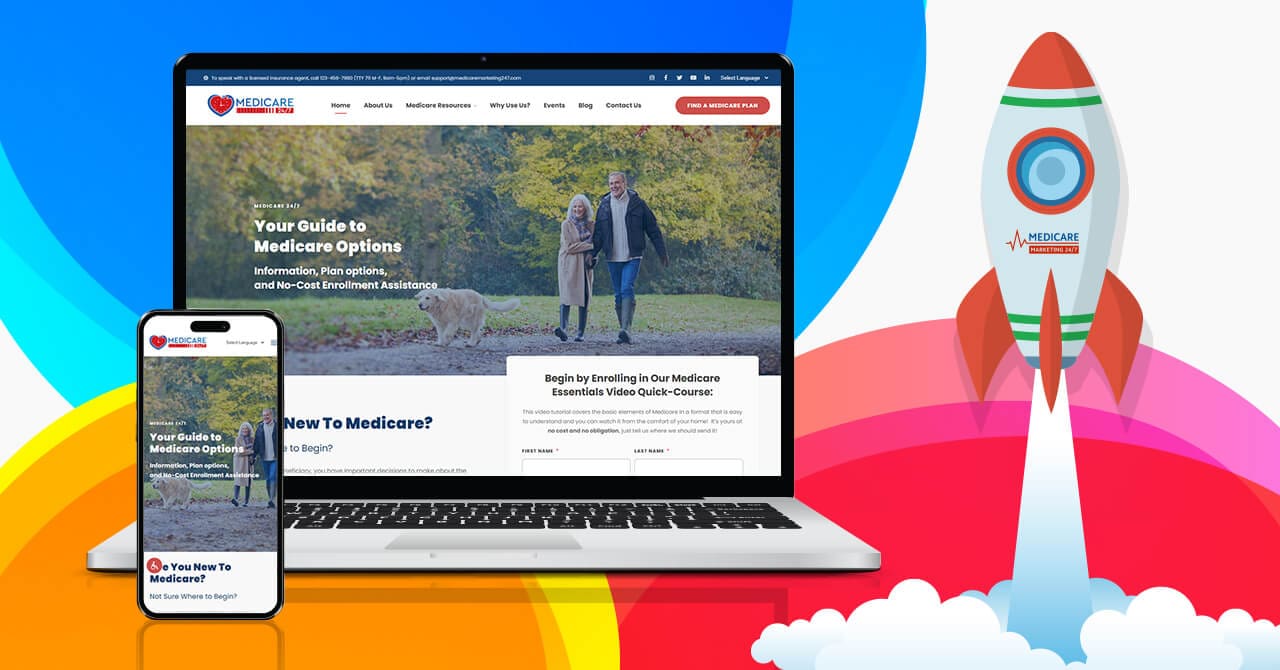
As a Medicare insurance agent, you understand the importance of helping your clients navigate the complexities of their healthcare options.
However, when it comes to your own business, particularly your website and online marketing efforts, it’s crucial to set the right expectations.
Many agents believe that simply having a website will automatically lead to a steady stream of inquiries and clients. While a strong online presence is essential, expecting your website to generate leads on its own can lead to disappointment. This article will guide you through understanding what your website can realistically achieve and how to align your marketing efforts with achievable goals.

1. Understanding the Role of Your Medicare Website
Your website is a vital tool in your overall marketing strategy, but it is not a silver bullet. It serves multiple purposes:
- Information Hub: Your website is often the first place potential clients will go to learn more about you and your services. It should clearly communicate who you are, what you offer, and how you can help them.
- Trust Builder: The design, content, and usability of your website contribute to building trust with visitors. A professional-looking site with valuable information can help establish you as an authority in the Medicare insurance space.
- Lead Conversion Platform: While generating leads is one of the goals, the website itself is more of a platform for converting interested visitors into leads. This requires not just traffic, but the right kind of traffic—visitors who are genuinely interested in your services.
Expecting your website to generate leads without ongoing marketing efforts is like expecting a storefront to bring in customers without advertising. The site is a crucial piece of the puzzle, but it needs to be part of a larger, integrated strategy.
2. The Challenge of Driving Traffic
For your website to generate leads, it must attract visitors. Traffic is the lifeblood of your website and driving it in the Medicare insurance space is particularly challenging.
- Content Marketing: Blogging, video content, and downloadable resources can attract visitors to your website by offering valuable information. Content marketing positions you as a thought leader and provides opportunities to capture leads.
- Paid Advertising: Google Ads, Facebook Ads, and other forms of paid advertising can bring immediate traffic to your website. However, these methods require investment and careful management to ensure you’re attracting the right audience.
- Social Media Marketing: Leveraging platforms like Facebook, LinkedIn, and even YouTube can help direct potential clients to your website. Social media allows you to engage with your audience, share valuable content, and build relationships that can lead to inquiries.
It’s important to recognize that these methods often need to be used in combination to be effective. Relying on just one approach may not yield the results you’re hoping for.
3. Lead Quality Over Quantity
Another key expectation to manage is the quality of leads your website generates. It’s easy to focus on the number of leads, but not all leads are created equal. High-quality leads are those that have a genuine interest in your services and are more likely to convert into clients.
To attract quality leads:
- Target Your Content: Ensure that the content on your website speaks directly to your ideal clients. If you specialize in certain Medicare plans or cater to a specific demographic, make that clear.
- Use Lead Magnets: Offering free resources such as eBooks, guides, or webinars in exchange for contact information can help you capture leads who are interested in your expertise.
- Clear Call-to-Actions (CTAs): Your website should have clear and compelling CTAs that guide visitors toward taking the next step, whether it’s filling out a contact form, scheduling a consultation, or signing up for your newsletter.
Remember, a high volume of leads that are not well-qualified can be detrimental, as it consumes time and resources without yielding results.
4. Patience and Consistency Are Key
Online marketing is not an overnight solution. Building a robust online presence takes time, consistency, and ongoing effort. It’s essential to be patient and persistent. Here are a few things to keep in mind:
- Content Takes Time to Gain Traction: While a blog post or video might not generate immediate leads, over time, as you build a library of valuable content, your authority and visibility will increase.
- Testing and Adjusting: Digital marketing involves a lot of testing—trying different ads, content formats, or keywords—and making adjustments based on what works. It’s a dynamic process that requires flexibility and continuous learning.
5. Integrating Offline and Online Medicare Marketing Strategies
While online marketing is essential, don’t neglect traditional methods of lead generation. Combining offline efforts with your online strategy can amplify your results. For instance:
- Networking: Attend local events, seminars, and community gatherings to build relationships that can later translate into online connections and leads.
- Direct Mail: A well-crafted direct mail campaign can drive traffic to your website or encourage recipients to call you for more information.
- Follow-Up: Use your website to capture leads, but follow up with phone calls, personalized emails, or even in-person meetings to nurture these leads and convert them into clients.
By integrating both online and offline efforts, you create a more holistic approach that covers all bases.

6. The Severe Challenges of SEO for a Medicare Agent
SEO is often touted as a critical strategy for online success, but in the Medicare insurance space, it presents severe challenges that can make it difficult to achieve a positive return on investment (ROI).
- High Competition: Medicare-related keywords are highly competitive, often dominated by large insurance companies and established agencies with significant marketing budgets. Competing for these keywords can be extremely costly and time-consuming.
- Complexity of the Product: Explaining Medicare in a way that appeals to both search engines and potential clients is challenging. The complexity of the product means that content must be both informative and easy to understand, which can be difficult to achieve.
- Regulatory Restrictions: The strict regulations around Medicare marketing also impact SEO efforts. Certain phrases and claims that might help with SEO are not permissible, limiting the effectiveness of content optimization.
- Long Time Horizon: SEO is a long-term strategy that can take months or even years to show results. In a fast-paced industry like Medicare insurance, this delay can be frustrating and may not align with the immediate needs of your business.
For these reasons, many Medicare agents find that SEO alone does not yield a positive ROI. While it can be a valuable component of a broader strategy, it’s crucial to manage expectations and consider other marketing avenues that may deliver quicker and more reliable results.
7. Measuring Success and Conversions
Lastly, it’s crucial to define what success looks like for your website and marketing efforts. Rather than focusing solely on the number of leads, consider the following metrics:
- Conversion Rate: What percentage of your website visitors become leads? This is a key indicator of how well your site is performing in terms of lead generation.
- Lead Quality: Are the leads you’re generating a good fit for your services? Quality is often more important than quantity.
- Return on Investment (ROI): Calculate the ROI of your marketing efforts to ensure that your investment is yielding profitable results.
Regularly review these metrics and adjust your strategy as needed. Setting realistic goals and understanding the metrics that matter will help you stay on track and make informed decisions.

Your Website Can Be One of the Best Strategies for Medicare Marketing!
Your website is a powerful tool in your Medicare insurance business, but it’s essential to have the right expectations. Generating leads online requires a multifaceted approach, combining a well-designed website with effective traffic-driving strategies and continuous effort.
By setting realistic goals, focusing on quality over quantity, and integrating your online and offline efforts, you can create a sustainable lead generation strategy that grows your business over time.
Remember, success in digital marketing doesn’t happen overnight—it’s about persistence, patience, and strategic planning.




